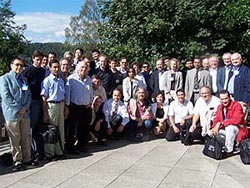Recent Stories
- Businesses urged to tap into science and technology young talent
- Digital relay baton enables remote crowd cheering of athletes
- Health Innovation Campus moves a step closer
- £7.1 million R&D boost for North West businesses
- Centre of excellence created for the next industrial revolution
- Artificial intelligence toolkit spots new child sexual abuse media online
- Strategic partnership set to help plug cyber security skills gap
- What your choice of smartphone says about you
- InfoLabTree: Discover the Story
- novi.digital Launch Event - 'An Event to Help Businesses Grow Online'
RSS Feeds
RSS feeds can deliver the latest InfoLab21 news and events direct to your browser without you having to visit the website.
In most browsers you can click on an RSS link and choose to subscribe to the feed to add it to your favourites or bookmarks.
Lancaster Hosts Evolving Intelligent Systems Conference
Story supplied by LU Press Office
 Members of the syposium
Members of the syposium
The 2006 International Symposium on Evolving Fuzzy Systems (EFS'06) offered a forum for the academic community and industry to share views and ideas about developing and using Evolving Intelligent Systems - technology that can make possible computers and machines that can 'think', 'learn', adapt and self-develop like humans.
Senior figures from companies including General Electric, Ford, The Dow Chemical Company and Nokia joined academics at the St Martin's College campus at Ambleside in the Lake District for the three day event.
It was organised by Lancaster University and the Institute of Electrical and Electronics Engineers (IEEE), which has members in over 150 countries.
Dr Plamen Angelov, the General Chair of the Symposium from the University's Department of Communications Systems at InfoLab21, said: "It's an exciting area because we want to develop autonomous systems like a robot which can adapt to its environment and evolve its 'intelligence', whether in a disaster zone or on another planet.
"Humans do not have a fixed set of knowledge but are learning all the time so we want to create algorithms for computational intelligence to enable machines to stand in for humans in hazardous or unknown environments.
"For example, people follow rules such as "If it is cold outside I will take a coat" or "If the distance to the car in front of mine is too small I will slow down". "Cold" and "too small" are usually not precisely defined. They are rather 'fuzzy' values defined by fuzzy sets. Fuzzy logic is a theory to represent the way humans manipulate knowledge, using so-called approximate reasoning."
Evolving fuzzy systems is an emerging area that is inspired by Nature and focuses on the evolution of the machine to enable it to learn and adapt to an unpredictable environment.
Possible applications include intelligent sensors in the oil industry, autonomous unmanned vehicles in the defence industry, personalised medicine tailored to the patient and personalised web usage, plus smart mobile phones that can restore lost portions of the signal.
The President of the North American Fuzzy Information Processing Society, Dr. Dimitar Filev, Senior Technical Leader at Intelligent Control and Information Systems, Ford Research and Advanced Engineering in Michigan, USA, said: "Recent advances in information technology, sensor networks and communications, exponentially increasing amounts of information, the need for autonomous systems and architectures for automated data summarization, soft sensing, prognostics, and new types of knowledge-based software application (intelligent agents) are some of the main technology drivers for the emerging research area of evolving systems.
"Evolving systems result from the synergy between conventional systems, neural networks and fuzzy systems as structures for information representation and the evolutionary and machine methods for learning. Embedded soft computing applications are the natural implementation area of evolving systems as one of the main tools for design of real time intelligent systems. EFS'06 was a great visionary event establishing and promoting the concept of evolving system."
Another senior participant from a leading global company, Dr. Arthur Kordon, R&D Leader at The Dow Chemical Company in Texas, added: "Evolving Intelligent Systems have a high potential for implementation in industry. EFS'06 was a very successful event that brought together the key theoretical leaders in the field with several big industrial participants, like GE, Ford, Nokia, and Dow Chemical. The interesting presentations and fruitful discussions have moved forward this new research area."
Dr. Oscar Cordon, the Chairman of IEEE's Genetic Fuzzy Systems Task Force and a Principal Researcher at the European Centre for Soft Computing in Asturias, Spain, said: "In my opinion, EFS '06 was an outstanding event, including the participation of world-wide recognized experts on the topic of genetic and evolving fuzzy systems. The organization was excellent and took special care to bring together people from academia and from industry, which can result in interesting collaborations in the near future."
One of the leading academics, Prof. Dr. Janusz Kacprzyk, Fellow of the IEEE, Fellow of the IFSA and Member of the Polish Academy of Sciences, said: "Not only a great number of very interesting papers have been presented but due to the proper choice of participants, EFS'06 has obtained a synergistic effect. I am sure that discussions have clarified many aspects of evolutionary fuzzy systems, and the conference will be an important event for this area, triggering further progress and new research directions."
Dr George D. Magoulas, from the University of London, said the Symposium created a lively atmosphere for discussing research with internationally recognised researchers.
"The Symposium helped existing collaborations to be extended and provided opportunities for new collaborations to be forged between industry and academia."
EFS '06 was organised by Lancaster University's InfoLab21 together with the Genetic Fuzzy Systems Task Force of the IEEE and the Engineering and Physical Sciences Research Council. It was co-sponsored by BAE Systems, Nokia-UK Ltd, J&S Marine and Retail Analytics.
Wed 27 September 2006
Associated Links
- Digital Signal Processing - part of the Department of Communication Systems
- International Symposium on Evolving Fuzzy Systems (EFS '06)



